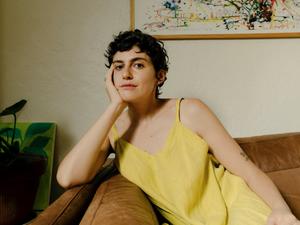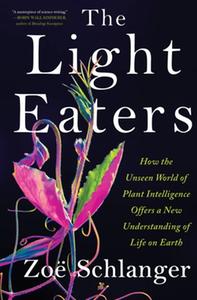
|
|
| photo: Heather Sten | |
Zoë Schlanger is a staff writer at the Atlantic, where she covers climate change. Her work has appeared in the New York Times, the New York Review of Books, Time, Newsweek, the Nation, and on NPR. She received a 2017 National Association of Science Writers' reporting award and was a finalist for the 2019 Livingston Award. She lives in Brooklyn, N.Y. Her first book, The Light Eaters (Harper, May 7, 2024), is about the world of plant intelligence research and the possibilities of nonhuman minds.
Handsell readers your book:
It's a gallivant through botany labs and forests in search of answers to the question: Are plants intelligent? It will make you see your houseplants as total aliens and regard a patch of woods with some mixture of trepidation and awe, ideally.
On your nightstand now:
I am reading Tove Jansson's The Summer Book. Her prose is spare and wry and weird and evokes the sublimity and cruelty of summer in a way nothing else does. I needed it to get through New York winter. Her book Fair Play is one of my favorites, about two women living on a small island trying to be partners and artists at the same time. I'm also reading Jill Lepore's The Deadline. Her essay "The Shorebird," about Rachel Carson's ocean writing, ran in the New Yorker in 2018 and is one of my favorite essays in the world. I carried a hard copy of that issue around to at least six different residencies while I was writing my book, just so I could reread the lead when I needed to. It drips with marine life, you could taste it. I'm also just cracking into Octavia Butler's Lilith's Brood, at last. Lustrous, biology-heavy sci fi--give it to me.
Favorite books when you were a child:
The Phantom Tollbooth by Norton Juster, A Wrinkle in Time by Madeleine L'Engle, and The Mists of Avalon by Marion Zimmer Bradley. I feel like there's a special kinship with people who loved The Mists of Avalon as kids and read it probably a touch too young. If you know you know.
 Your top five authors:
Your top five authors:
Clarice Lispector, the patron saint of metaphors for the inexpressible mystery of being alive; Octavia Butler, whose Parable of the Sower is always in my head; Ursula K. Le Guin for sci fi that speaks to every current moment, Ann Patchett for so many things but especially her Brazilian scientist epic State of Wonder.
Book you've faked reading:
I haven't done this since college. But back then I got away without ever reading Foucault. I could probably still tell you what he thought about things, because everyone was always talking about him.
Book that changed your life:
Braiding Sweetgrass by Robin Wall Kimmerer. Her meditation on the concept of ecological gifts inserted itself permanently into my brain and changed my day-to-day thought processes.
Book you're an evangelist for:
I would have said The Three-Body Problem by Cixin Liu, but now everyone knows about that one. I'll have to come up with something else to proselytize about. It was A Tale for the Time Being by Ruth Ozeki for a long while--it does very good things to the mind--but now I've gotten most of my friends to read it. If I'm honest, it will probably always be Braiding Sweetgrass.
Five books you'll never part with:
Zami by Audre Lorde, which I love more than nearly any other text. Near to the Wild Heart by Clarice Lispector, which I return to when I need to drown for a moment in the enigma of human experience. Parable of the Sower by Octavia Butler, which is truth-telling and future-casting at the highest level. Pilgrim at Tinker Creek by Annie Dillard for lessons in making the quotidian alien. And Rachel Carson's The Sea Around Us--there is no better example of clear science communication out there.
Book you most want to read again for the first time:
Letters to a Young Poet by Rainer Maria Rilke. My friend Lucy gave me my copy when I was maybe 21, 22. I'll never get to feel those lessons on creative work and love and self-regard hit me in the chest for the first time again. They've got to get you while young, I think, but they're very good.

